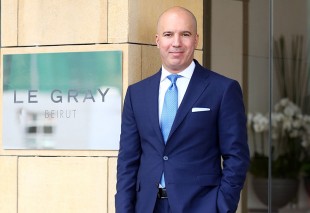

GM Interview: Le Gray Beirut's Georges Ojeil

Opened in 2009, Le Gray Beirut is CampbellGray’s first hotel in the Middle East and, when we spoke to its GM in March this year, was gearing to complete the final stages of an extension project which includes business and events facilities, a new lobby lounge, an exhibition venue, and 16 new guestrooms. The project was being overseen by interior designer Galal Mahmoud in close collaboration with Gordon Campbell Gray.
The boutique hotel’s general manager, Georges Ojeil, is confident that all these additions will only enhance the property’s reputation. He tells Hotelier: “The decision to expand in the hotel was taken a couple of years ago, especially during the time when we started facing complications on the local political scene — so it was best to invest during tough times so that we can benefit from it during the good times.”
The new guestrooms will complement existing accommodation in the same contemporary-classic style, while the extended lobby area underneath the atrium and its new Lobby Lounge, along with a new pedestrian entrance, will welcome guests into the new space directly on Weygand Street. Ojeil says the atrium will be naturally lit, with the open space spanning from the basement level until the ninth floor.
There has been an increase in MICE space as well: The Boardroom will be able to hold a 20-people meeting, while the Grand Salon is spread across 400m2. Accordingly, the scope of its business has now been expanded to attract the MICE market as well as its existing leisure and corporate source markets. Ojeil tells Hotelier that Le Gray is hoping to offer its service to C&E on an individualised level. He adds: “We will be looking into more personalised C&E functions.” A few other meeting rooms such as the Muse Room — a multi-function venue — and the Screening Room, a brand new 52-seat mini cinema fitted out with audio-visual equipment and comfortable seating has also been added.
Naturally, working on a refurb involves training to ensure any guest queries or complaints are handled appropriately. Ojeil says the team worked on a strategy to manage service recovery — especially for complaints around noise pollution. He says: “We adopted a strategy where we were accommodating guests on the highest floors possible — away from the noise. We were in a position to offer upgrades to ensure guests are happy and we managed their expectations. In parallel, our team members were trained in managing guest expectations, so every time there was a noise complaint, we were addressing this and were accommodating the guest needs and demands.”
Ojeil is pleased with how his team handled the entire situation. “The team managed to do a fantastic job because before the construction, the hotel was ranked 15th on Beirut TripAdvisor and during the construction we managed to become the first in Lebanon. Our quality ratios didn’t drop below 91%,” he reveals.
This is the first time the hotel has undergone a major refurbishment, and Ojeil says this is the first time he has been in charge of a boutique hotel. He comments: “I took on this challenge during a very tough time. There were demonstrations in Beirut, we went through travel bans, and with what’s happening in Syria, it was quite challenging managing the operations and managing the expansion. We saw that short-term savings are long-term losses, so we focused a lot on managing the expectations, continuously delivering quality while balancing financial returns, and definitely delivering the best product possible once the newly added facilities are handed over.”
He says he’s proud of the team with the outcome, which including good ratings, and stable occupancy and ARR. “Our occupancy was on an ascending stage and the ARR fluctuated due to the macro factors impacting Lebanon. When the demand dropped, there was a price war in Beirut and we had to cope with that, but we didn’t drop that much because we wanted to maintain our benchmark in the market and maintain the positioning of the hotel as the top luxury boutique hotel in Beirut,” Ojeil says.
He adds: “We did drop slightly because of the situation but we managed to close 2016 with 67% occupancy, which is a very decent occupancy and result, considering the circumstances.”
Ojeil notes that the property competes with the likes of the Four Seasons Hotel Beirut when it comes to pricing, and he believes that the new facilities, with an ROI of approximately four-five years, will definitely contribute to the development of the hotel and make it more competitive than ever before. He says: “My wish is that we succeed fully in launching these facilities and attain top quality levels and the target for financial return. Once we are done, we have new projects to develop in other parts of the building and could look at, as well, outside catering.”